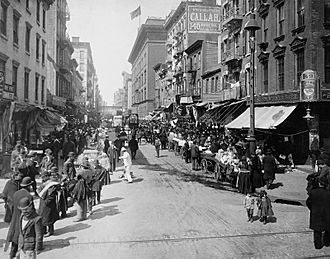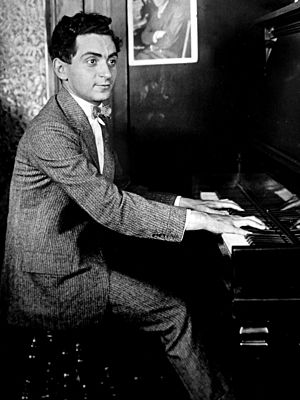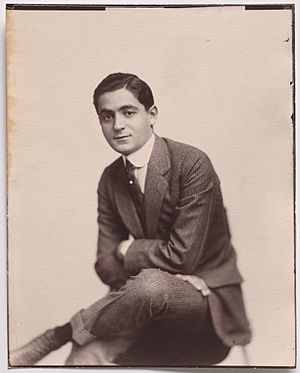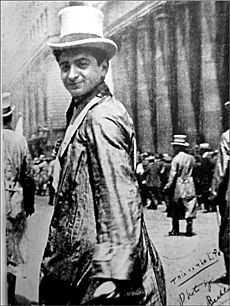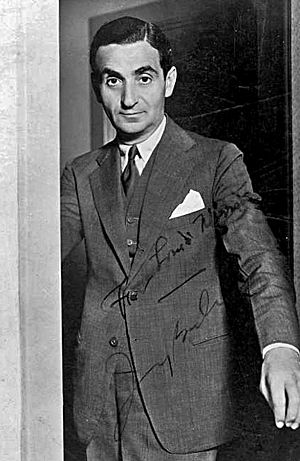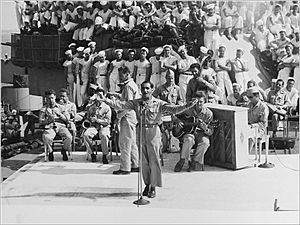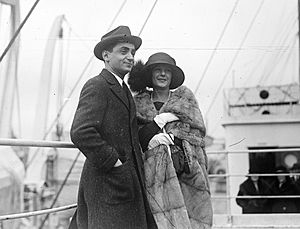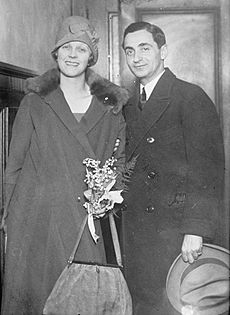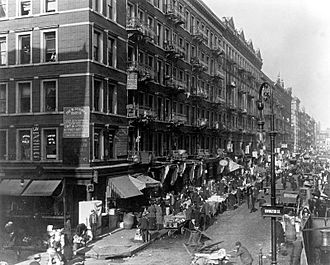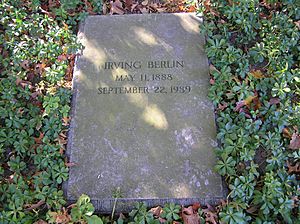Irving Berlin facts for kids
Quick facts for kids
Irving Berlin
|
|
|---|---|
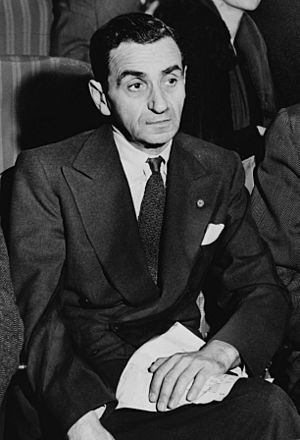
Berlin in 1948
|
|
| Born |
Israel Beilin
May 11, 1888 Tyumen, Russian Empire
|
| Died | September 22, 1989 (aged 101) New York City, U.S.
|
| Occupation |
|
| Years active | 1907–1971 |
| Known for | Popular songs, ragtime, Broadway musicals, show tunes |
| Spouse(s) |
Dorothy Goetz
(m. 1912; died 1912)Ellin Mackay
(m. 1926; died 1988) |
| Children | 4, including Mary Ellin Barrett |
| Military career | |
| Allegiance | |
| Service/ |
United States Army |
| Years of service | 1918–1919 |
| Rank | |
| Unit | 152 Depot Brigade |
| Battles/wars | World War I |
Irving Berlin (born Israel Beilin; May 11, 1888 – September 22, 1989) was an American composer and songwriter. He wrote the words and music for hundreds of famous songs, many of which are still loved today. His music is a big part of what's called the "Great American Songbook," which is a collection of important American songs.
Berlin was born in Russia and came to the United States when he was five years old. He published his first song in 1907. He became famous for international hits like "Alexander's Ragtime Band" in 1911. He also owned the Music Box Theatre on Broadway, where many of his shows were performed. Even though he wrote so much music, Berlin couldn't read sheet music very well. He mostly played piano in one key, F-sharp, and used a special piano with a lever to change keys when he needed to.
His songs were known for being simple and direct, aiming to "reach the heart of the average American." Many of his songs became popular themes and anthems, like "White Christmas" and "God Bless America". He wrote about 1,500 songs during his 60-year career, including music for 20 Broadway shows and 15 Hollywood films. His songs were nominated for Academy Awards (movie awards) eight times.
Many famous singers have recorded Berlin's songs, including Bing Crosby, Frank Sinatra, Judy Garland, and Elvis Presley. Berlin lived to be 101 years old. Other famous composers like George Gershwin and Jerome Kern called him "the greatest songwriter that has ever lived" and said he was American music.
Contents
Early Life
Coming to America
Berlin was born Israel Beilin on May 11, 1888, in the Russian Empire. His family was Jewish, and his father was a cantor, which is a singer in a synagogue. They were one of many Jewish families who moved to the United States in the late 1800s and early 1900s. They were escaping unfair treatment and poverty in Russia.
In September 1893, when Israel was five, his family arrived at Ellis Island in New York City. When they came to America, their last name was changed to "Baline." Berlin later said he didn't remember much about Russia, except for seeing his house burn down. He grew up very poor but said he didn't realize it because he didn't know any other way of life.
Settling in New York City
After arriving in New York City, the Baline family lived in a small apartment in a crowded area called the Lower East Side. His father couldn't find work as a cantor, so he worked at a kosher meat market and taught Hebrew lessons. He died when Irving was only thirteen.
With only a few years of schooling, eight-year-old Irving started working to help his family. He sold newspapers, shouting out the headlines. One day, he almost drowned while delivering papers, but he still held onto the five pennies he had earned. His mother became a midwife, and his sisters worked making cigars. Everyone in the family gave their earnings to his mother.
Young Irving, or "Izzy" as he was called, started singing songs he heard in the busy streets of the Bowery. People would sometimes give him coins for his singing. He dreamed of becoming a singing waiter in a saloon. He soon got jobs singing and helping to promote songs in cafes and restaurants. His first song lyric, written with a pianist, earned him only 37 cents.
Before he was fourteen, Berlin felt his small earnings weren't enough. He decided to leave home and live on his own in the Bowery, like many other young immigrants. He learned about life on the streets and how to make money from his music.
Early Jobs and First Songs
Berlin left school around age thirteen. His only real skill was singing, which he learned from his father. He joined other young singers who performed in saloons, hoping to earn a few pennies. He learned that simple songs with clear feelings were the most popular.
In 1906, at age 18, he got a job as a singing waiter at the Pelham Cafe in Chinatown. He served drinks and sang funny versions of popular songs. In his free time, Berlin taught himself to play the piano. He never had lessons. After the bar closed, he would sit at the piano and make up tunes.
He published his first song, "Marie from Sunny Italy," in 1907. He wrote it with the cafe's pianist, Mike Nicholson, and earned 33 cents for it. The published music showed his name as "I. Berlin."
Berlin kept writing and playing music at the Pelham Cafe. He liked the words of other songs but sometimes changed their rhythms to make them better. He even sang songs by his friend, George M. Cohan, who was also becoming known on Broadway.
A staff member from a music publishing company, Max Winslow, noticed Berlin's talent. He helped Berlin get a job with the Harry Von Tilzer Company in 1908. Berlin then moved to a new job at Jimmy Kelly's saloon, where he worked with other young songwriters. In 1909, he got a big break as a lyricist (someone who writes song words) for the Ted Snyder Company.
Berlin quickly became one of the best lyric writers. He even performed his own songs in a Broadway show. He started composing music by accident when a publisher thought a lyric he sent was supposed to have music with it. Berlin quickly wrote a tune, and it was accepted. This opened the door for him to write both words and music. In 1910, he wrote "Alexander's Ragtime Band", which became a huge hit and made him one of the top composers.
Songwriting Career
Early Hits (Before 1920)
"Alexander's Ragtime Band" (1911)
Berlin became very famous in 1911 with his song "Alexander's Ragtime Band." It was first sung by Emma Carus and then by Berlin himself. He became an instant celebrity. The New York Telegraph newspaper wrote about how 200 of his old friends from the streets came to see him perform.
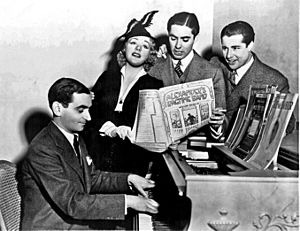
This song helped bring back the popularity of ragtime music, which had started earlier. It made Berlin a songwriting star. Many famous singers recorded it, including Bessie Smith, Louis Armstrong, and Bing Crosby. Over the years, "Alexander's Ragtime Band" had many hit versions.
At first, the song wasn't seen as a hit. A Broadway producer didn't think it was good enough. But after Berlin added lyrics and it was performed again, a newspaper called it "the musical sensation of the decade." Composer George Gershwin said it was "the first real American musical work."
Starting a Dance Craze
Berlin was surprised by how popular "Alexander's Ragtime Band" became all over the world. He thought it was because the simple lyrics and catchy melody made people want to dance. The song started a national dance craze.
In 1914, Berlin wrote a musical show called Watch Your Step, which featured famous dancers Vernon and Irene Castle. This show was Berlin's first complete musical score, with songs that were very clever and modern. The show was a huge success.
It's interesting that Russia, the country Berlin's family had to leave, also loved ragtime music. People there danced with wild energy to the new beat.
Simple and Romantic Songs
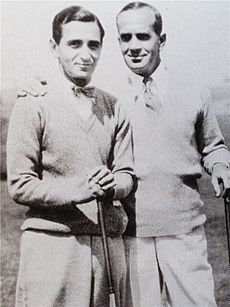
Some of Berlin's songs came from his own sadness. In 1912, he married Dorothy Goetz, but she died six months later from a sickness she got on their honeymoon. To show his grief, he wrote his first ballad, "When I Lost You." It became a very popular song, selling over a million copies.
He realized that ragtime wasn't the best style for serious love songs. So, he started writing more romantic songs. In 1915, he wrote the hit "I Love a Piano," which was a funny ragtime love song.
By 1918, Berlin had written hundreds of songs. Many were for new dances like the foxtrot. He wrote new songs almost every week, including some for different immigrant groups. He once told fellow train passengers that he wrote all the hit songs they were singing, and they were surprised!
An important song Berlin wrote that showed his change from ragtime to ballads was "A Pretty Girl is Like a Melody." It became a very popular song for the Ziegfeld Follies of 1919 show. It was so popular that it became the theme song for all of Ziegfeld's shows and was even used in a 1936 movie.
World War I Efforts
When America entered World War I in 1917, Berlin felt that songwriters should help support the war. He wrote "For Your Country and My Country," saying that Americans should show their thanks to the country that welcomed immigrants. He also wrote "Let's All Be Americans Now" to help end ethnic conflicts.
Yip Yip Yaphank
In 1917, Berlin was drafted into the United States Army. The Army wanted him to do what he did best: write songs. While he was stationed at Camp Upton, he created a musical show with only soldiers as performers. It was called Yip Yip Yaphank and was a patriotic tribute to the Army. The show went to Broadway and included hits like "Mandy" and "Oh! How I Hate to Get Up in the Morning", which Berlin sang himself.
The shows raised $150,000 for a service center at the camp. Berlin wrote another song for the show but didn't use it then. He would introduce it 20 years later: "God Bless America".
The Roaring Twenties and Beyond (1920 to 1940)
After the war, Berlin returned to writing popular songs. In 1921, he partnered with Sam Harris to build the Music Box Theatre on Broadway. This theater was special because it was built just for Berlin's shows. He oversaw every detail of his musicals, from costumes to casting.
The Music Box Theater hosted Berlin's Music Box Revue shows from 1921 to 1925. These shows featured songs like "Say It With Music" and "Everybody Step." Life magazine called Berlin the "Lullaby Kid" because his romantic songs like "Always" and "What'll I Do" touched so many people's hearts.
Famous Songs by Berlin
- "What'll I Do?" (1924): This sad love song was a big hit for Paul Whiteman and was recorded by many others.
- "Always" (1925): Berlin wrote this song when he fell in love with Ellin Mackay, who became his wife. It was a hit multiple times and is still played at weddings.
- "Blue Skies" (1926): He wrote this song after his first daughter was born, expressing his happiness about being a husband and father. It was sung by Al Jolson in the first feature sound film, The Jazz Singer.
- "Puttin' On the Ritz" (1928): This song is known for its tricky rhythm and is often linked with Fred Astaire, who danced to it in a movie. It was also used in the movie Young Frankenstein and became a hit again in the 1980s.
- "Marie" (1929): This waltz song was a hit for Rudy Vallée and later for Tommy Dorsey.
- "Say It Isn't So" (1932): This song became an overnight hit after Rudy Vallée sang it on his radio show. It even helped Vallée and his wife decide to stay together.
- "I've Got My Love to Keep Me Warm" (1937): This song was performed in the film On the Avenue and had several popular versions.
"God Bless America" (1938)
Berlin had written "God Bless America" twenty years earlier, but he put it away. In 1938, singer Kate Smith needed a patriotic song for a special event, and Berlin decided to use it. The song was released during the end of the Great Depression, a tough time for America. It quickly became a symbol of American patriotism and faith.
Berlin's daughter said the song was very personal for him. It showed his deep thanks to America for letting him, a poor immigrant, become a successful songwriter. Berlin said, "To me, 'God Bless America' was not just a song but an expression of my feeling toward the country to which I owe what I have and what I am."
The song became like a second national anthem when America entered World War II. Berlin gave all the money earned from the song to the Boy Scouts and Girl Scouts. In 1954, President Dwight D. Eisenhower gave Berlin a special award for the song.
"God Bless America" is still sung at important events, like after the September 11, 2001, attacks. It's also often played at sports games.
Other Broadway Shows
While many of Berlin's shows were "revues" (collections of songs without a story), he also wrote full musicals. The Cocoanuts (1929) was a comedy starring the Marx Brothers. Face the Music (1932) was a political comedy. As Thousands Cheer (1933) was a revue where each song was like a newspaper article. It included hits like "Easter Parade" and "Supper Time", a powerful song about racial violence sung by Ethel Waters.
World War II and Later Shows (1941 to 1962)
"This is the Army" (1943)
Berlin loved his country and wrote many patriotic songs. During World War II, he wrote "Any Bonds Today?" to encourage Americans to buy war bonds. He gave all the money from this song to the U.S. Treasury. He also wrote songs for other government groups, giving all the profits to them.
His most important contribution to the war effort was a stage show called "This Is The Army." It had a cast of 300 soldiers and toured military bases around the world, even near battle zones. Berlin wrote almost 30 songs for the show and traveled with it, always singing "Oh! How I Hate to Get Up in the Morning". He didn't take any salary or expenses for three and a half years, giving all the money to the Army Emergency Relief Fund.
The play was made into a movie in 1943, starring Ronald Reagan. Kate Smith also sang "God Bless America" in the film. The show and movie together raised over $10 million for the Army. President Harry S. Truman gave Berlin an award for his help in boosting troop morale. Berlin said those years with the show were the "most thrilling time of his life."
Annie Get Your Gun (1946)
After the war, Berlin was tired from touring with "This Is The Army." But when his friend, composer Jerome Kern, suddenly died, producers Richard Rodgers and Oscar Hammerstein II asked Berlin to write the music for a new musical called Annie Get Your Gun.
The show was based on the life of sharpshooter Annie Oakley. Berlin first said no, claiming he knew nothing about "hillbilly music." But he took the job, and the show became his most successful musical, running for 1,147 performances. It included famous songs like "There's No Business Like Show Business" and "Anything You Can Do (I Can Do Better)".
One reviewer said the show's songs were tough and clever, with catchy melodies that many other composers tried to copy. Berlin's daughter said that while he sometimes wrote songs quickly, he usually "sweated blood" to create them. Annie Get Your Gun is considered Berlin's best musical because its songs not only became hits but also helped tell the story and develop the characters.
Final Shows
Berlin's next show, Miss Liberty (1949), wasn't as successful. But Call Me Madam (1950), starring Ethel Merman, was a big hit and his second-greatest success. In 1962, at age 74, he returned to Broadway with Mr. President. Although it ran for eight months, it wasn't one of his biggest hits.
After this, Berlin officially retired. He wrote one more song, "An Old-Fashioned Wedding," for a 1966 revival of Annie Get Your Gun. Even though he lived for 23 more years, this was one of his last published songs. He stayed out of the public eye but continued to manage his songs through his own music publishing company.
Film Scores
From the 1920s to the 1950s
In 1927, Berlin's song "Blue Skies" was in the first full-length "talkie" (movie with sound), The Jazz Singer, starring Al Jolson. Later, Berlin wrote music for many famous movie musicals. These films starred actors like Bing Crosby, Fred Astaire, Judy Garland, and Ginger Rogers.
Movies like Top Hat (1935) had all new songs by Berlin. Other films with his new music included Follow the Fleet (1936) and Carefree (1938). Starting with Alexander's Ragtime Band (1938), he often mixed new songs with older ones from his collection. He did this for films like Holiday Inn (1942), Blue Skies (1946), and White Christmas (1954).
"White Christmas" (1942)
The 1942 film Holiday Inn introduced "White Christmas". This song became one of the most recorded songs ever. First sung in the movie by Bing Crosby, it has sold over 50 million records and was number one on the music charts for 10 weeks. Crosby's version is the best-selling single of all time.
The song became even more important because it was released soon after America entered World War II. It spoke to soldiers who were away from home for the first time, making them feel a longing for home and childhood. Poet Carl Sandburg said the song helped people feel a little sad and lonely without being gloomy, and that it showed love for things "we're going to have sometimes if the breaks are not too bad against us."
"White Christmas" won Berlin an Academy Award for Best Original Song. He received seven Oscar nominations during his career. Berlin was the only person to ever open the envelope and announce his own name as the winner! This was so unusual that the Academy changed the rules for future awards.
Composer Garrison Hintz said that even though songwriting can be complex, the final song should sound simple. "White Christmas" has only eight sentences, but it managed to sell over 100 million copies and capture the hearts of Americans.
How He Wrote Songs
Berlin's manager said that it was a habit for Berlin to write a complete song, with words and music, every day. Berlin believed that his most successful songs were the result of hard work, not just sudden inspiration. He often wrote under pressure, starting after dinner and working until early morning. He would attend rehearsals during the day and then write a new song to bring in the next day.
Berlin once asked a friend, composer Victor Herbert, if he should study music composition. Herbert told him, "You have a natural gift for words and music. Learning theory might help you a little, but it could cramp your style." Berlin followed this advice. Herbert later helped create ASCAP (the American Society of Composers, Authors and Publishers), which protects the rights and earnings of composers and writers. Berlin became a founding member in 1914.
Later in life, Berlin said that the words (lyrics) make a song a hit, but the tune makes it last. He mostly played piano in the key of F sharp, using the black keys. He owned three special pianos that had a lever to change keys. Even though he eventually learned to write down music, he always dictated his songs to a "musical secretary."
Some people who loved the music of other composers like Jerome Kern or Cole Porter didn't always realize that Berlin wrote many different kinds of popular songs, from romantic melodies like "What'll I Do?" to more complex ones like "Cheek to Cheek." Berlin's songs always showed that he understood the world around him and the feelings of the time.
Music Style
Composer Jerome Kern said that Irving Berlin's songs were special because they used "American everyday language." His best-known songs feel like they are part of America's history. While other composers mixed different music styles, Berlin's songs were always simple and well-made. They seemed to flow naturally from how people talked every day. This led composer George Gershwin to say that Berlin taught him that ragtime, which became jazz, was the only music style that could truly express America.
Another famous songwriter, Cole Porter, wrote music that was often seen as more "witty" and "sophisticated." Unlike Berlin, Porter came from a wealthy family and went to Yale University. He didn't become successful until he was in his thirties. It was actually Berlin who helped Porter get the show that started his career.
Personal Life
Marriages
In February 1912, Berlin married 20-year-old Dorothy Goetz. She was the sister of one of Berlin's songwriting partners. Sadly, during their honeymoon, she got typhoid fever and died six months later. Berlin was heartbroken and couldn't write for months. He eventually wrote his first ballad, "When I Lost You", to express his sadness.
Years later, in the 1920s, he fell in love with Ellin Mackay, a young writer and heiress. Their relationship was big news because Berlin was Jewish and Ellin was Catholic. Ellin's father, a very important businessman, did not approve of their marriage.
They met in 1924, and her father tried to keep them apart, even sending her to Europe. But Berlin wrote her letters and sang songs like "Remember" and "All Alone" on the radio. They decided to elope and got married secretly in a simple ceremony.
The news of their wedding was on the front page of The New York Times. Ellin's father was shocked. Berlin gave the rights to his song "Always" to Ellin as a wedding gift, making sure she would always have an income. For almost three years, Ellin's father refused to speak to them. But they made up after their baby son, Irving Berlin Jr., died in 1928, less than a month after he was born.
Irving and Ellin had a loving marriage that lasted 63 years until she died in 1988. They had four children: Mary Ellin, Irving Jr. (who died as a baby), Linda Louise, and Elizabeth Irving.
Lifestyle
In 1916, another composer, George M. Cohan, said that even though Berlin had become rich and famous, he hadn't changed. He still remembered his friends and was down-to-earth.
Berlin often visited his old neighborhoods in New York City, like the Lower East Side. He never forgot his childhood years when he "slept under tenement steps, ate scraps, and wore secondhand clothes." He said, "Every man should have a Lower East Side in his life." He also visited The Music Box Theater, which he founded. From 1947 to 1989, Berlin lived in a home at 17 Beekman Place in New York City.
Berlin was described as a nervous person who would tap his finger to make a point. He was also very enthusiastic. His daughter said he was a loving family man, even though he worked a lot. He was usually cheerful but had some sad times too.
In his later years, Berlin stayed out of the public eye. He didn't even attend his own 100th birthday celebration at Carnegie Hall. His parents loved to celebrate every holiday with their children. Berlin once joked about his wife's spending, "I gave up trying to get your mother to economize. It was easier just to make more money."
Berlin voted for both Democrats and Republicans. He supported Dwight D. Eisenhower for president, and his song "I Like Ike" was used in Eisenhower's campaign. In his later years, he became more traditional in his views on music. His daughter said he was "consumed by patriotism." He often said, "I owe all my success to my adopted country" and insisted on paying taxes because he loved America.
Berlin was a Freemason, a member of a social organization. He was also a strong supporter of civil rights. In 1944, he was honored for helping to reduce religious and racial conflict. His 1943 show "This Is The Army" was the first integrated army unit in the United States, meaning Black and white soldiers performed together. In 1949, he was honored as one of the "most outstanding Americans of Jewish faith." Even though he was culturally Jewish, he was not religious. Because of his support for civil rights, he was investigated by the FBI for years.
Death
Irving Berlin died peacefully in his sleep at his home in Manhattan on September 22, 1989. He was 101 years old. He was buried in Woodlawn Cemetery in The Bronx, New York City.
After his death was announced, the lights on Broadway theater signs were dimmed in his memory. President George H. W. Bush said Berlin was "a legendary man whose words and music will help define the history of our nation." Former President Ronald Reagan, who was in Berlin's 1943 musical This Is the Army, said Berlin's "musical genius delighted and stirred millions and will live on forever."
Morton Gould, the president of ASCAP, said Berlin "touched so many people in so many age groups over so many years." Singer Ginger Rogers, who danced to Berlin's songs with Fred Astaire, said working with Berlin was "like heaven."
Legacy and Influence
The New York Times wrote after his death that "Irving Berlin set the tone and the tempo for the tunes America played and sang and danced to for much of the 20th century." As an immigrant from Russia, his life was a "classic rags-to-riches story" that he believed could only happen in America. He wrote about 1,500 songs and was a legend by the time he was 30. He wrote music for 20 Broadway shows and 15 Hollywood films, and his songs were nominated for Academy Awards eight times. Music historian Susannah McCorkle said his work was "amazing" in its range, amount, and quality.
During his career from 1907 to 1966, his music was everywhere: in sheet music, Broadway shows, recordings, radio, films, and television. His songs still bring strong feelings to millions worldwide. He wrote songs like "Alexander's Ragtime Band," "Cheek to Cheek," "There's No Business Like Show Business," "Blue Skies," and "Puttin' On the Ritz." Some of his songs became holiday favorites, such as "Easter Parade", "White Christmas", and "Happy Holiday". "White Christmas" alone sold over 50 million records, making it the best-selling single in history.
In 1938, "God Bless America" became like an unofficial national anthem for the United States. On September 11, 2001, members of the U.S. Congress stood together and sang "God Bless America" after the terrorist attacks. The song became popular again, and Celine Dion recorded it for a benefit album. The Postal Service even released a stamp honoring Berlin. The Boy Scouts and Girl Scouts of New York have received over $10 million in royalties from "God Bless America" because Berlin donated the money to them.
In 1934, Time magazine featured him on its cover, calling him "an American institution." Berlin's songs also supported different causes. He wrote songs for presidential candidates, against Prohibition (when alcohol was illegal), to help during the Great Depression, and to support the war against Hitler. In 1950, he even wrote a song for the state of Israel.
Berlin also had an impact on American law. In 1961, his publishing company sued Mad Magazine for copyright infringement because the magazine published parody lyrics (funny versions) of popular songs. Berlin lost the case, and the court's decision in 1964 set an important rule: it established the rights of people who create parodies and satire to mimic popular songs.
At his 100th birthday celebration in 1988, violinist Isaac Stern said, "American music was born at his piano." Songwriter Sammy Cahn said, "If a man, in a lifetime of 50 years, can point to six songs that are immediately identifiable, he has achieved something. Irving Berlin can sing 60 that are immediately identifiable... You couldn't have a holiday without his permission."
ASCAP's records show that 25 of Berlin's songs reached the top of the charts. Many famous singers recorded them, including Bing Crosby, Frank Sinatra, and Ella Fitzgerald.
Awards and Honors
- Academy Award for Best Original Song in 1943 for "White Christmas" from the movie Holiday Inn.
- US Army Medal of Merit from President Harry S. Truman.
- Tony Award in 1951 for Best Score for the musical Call Me Madam.
- Congressional Gold Medal in 1954 from President Dwight D. Eisenhower for his many patriotic songs, including "God Bless America."
- Special Tony Award in 1963.
- Grammy Lifetime Achievement Award in 1968.
- Inducted into the Songwriters Hall of Fame in 1970.
- Presidential Medal of Freedom in 1977 by President Gerald Ford. The award said Berlin "Has Captured The Fondest Dreams And Deepest Emotions Of The American People In The Form Of Popular Music."
- Lawrence Langner Tony Award in 1978.
- Medal of Liberty in 1986 during the celebration for the Statue of Liberty.
- 100th birthday celebration concert in 1988.
- Jewish-American Hall of Fame in 1988.
- Star on the Hollywood Walk of Fame in 1994.
- American Theater Hall of Fame.
Musical Scores
This list includes the main stage and film musicals Berlin wrote.
Stage Musicals
|
|
Film Scores
|
|
*These films were originally stage musicals.
Images for kids
See also
 In Spanish: Irving Berlin para niños
In Spanish: Irving Berlin para niños
 | Lonnie Johnson |
 | Granville Woods |
 | Lewis Howard Latimer |
 | James West |


